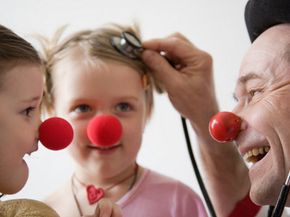Key Takeaways
- Laughter therapy involves using humor to improve health and relieve stress, with benefits including pain relief and enhanced mood.
- Studies have shown that laughter can increase pain tolerance, improve blood flow and release endorphins, acting as an "internal jogging" that offers psychological and physiological benefits.
- By stimulating the release of endorphins, laughter therapy helps reduce stress, anxiety and increases personal energy.
If you've read Stephen King's "It," then you might suffer from coulrophobia, the fear of clowns. These circus mainstays seem to have more foes than friends, particularly when you scan the numerous horror films that feature these sadistic entertainers. In a study conducted by the University of Sheffield, children reported that they would find a hospital decorated with clowns "frightening and unknowable" [source: Rohrer].
Those kids better buck up, because clowns in hospitals aren't going away anytime soon. Clowns can be a key part of laughter therapy, which relies on various techniques designed to produce laughter. Laughter is believed to be beneficial to patients because it reduces anxiety and stress, renders pain manageable and bolsters the immune system.
Advertisement
Horror writer Ramsey Campbell spoke to the BBC in 2008 about people's fear of clowns, which he believes is due to a clown's unchanging mask of forced comicality [source: Rohrer]. Yet advocates of laughter therapy believe that laughing is what helps us rid ourselves of our own masks of fear and pain. From workplaces to therapists' offices to hospitals, laughter coaches aim to get people laughing in an effort to get them to be their best selves. By laughing, the theory goes, you're able to keep your cool in a stressful work situation, make peace with the hurt and pain in your past or deal with the stress of a serious illness.
That doesn't mean the days of "take two aspirin and call me in the morning" are completely gone. Laughter therapy can't take the place of conventional therapies entirely, but there is increasing evidence that a few hearty chuckles can help you along the road to recovery. You might see more humor rooms in hospitals, as well as laughter wagons full of funny books, games and toys roaming the halls. You might be asked to do a few laughter exercises before your shift at work or before baring your soul to your therapist. And don't forget the clowns -- they'll be there, too. Before we send in the clowns, let's take a look at what they're trying to accomplish with their zany brand of therapy.
Advertisement




